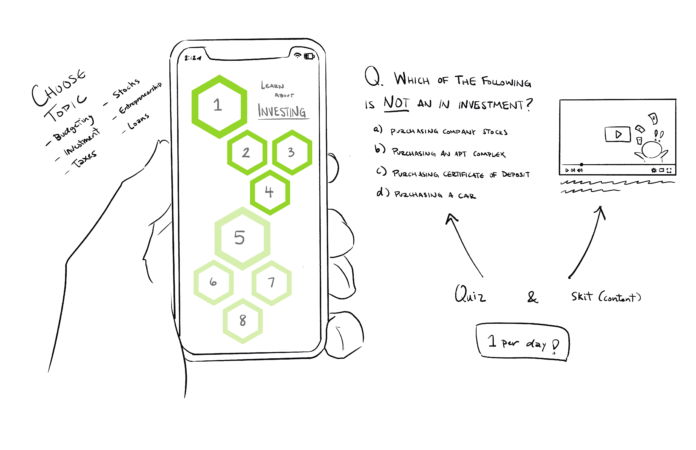The main takeaways from the reading were the close relationship between mathematical and language arts subjects with financial literacy; the extensive duration students will need to practice relevant topics to not only attain knowledge but a longer-lasting attitude toward caring about their own future (or present) financial affairs, and potentially shifting the context to something not solely related to finance to minimize the intimidating factors involved in teaching younger students about money.
This focus conjecture emphasizes taking minimal steps each day to slowly build up the foundation of a topic of the user’s choice. The user will download this Huntington-branded app that will initially take them to a set of topics that they will choose right off the bat. The app will then quiz them to calculate their current level and where on the map they would start. From where the user is placed, they can move onto as many spaces as they want to. Each space will come with a skit that shows a realistic situation in which the user might use that content. Users also have the flexibility to cover multiple topics at a time if they want to expand their financial literacy horizon.
This conjecture is inspired by a combination of daily comics that were popular a few years ago before everything became more digitized and a language learning app Duolingo. Although Duolingo shows miniature steps, users are nudged into the habit of completing short but condensed information sessions followed by quizzes covered during the content. However, the style of learning is catered toward the nature of language learning which cannot quite be applied the same way to financial literacy. With an already intimidating environment, the finance world has created, the final product will need interactable features in a whimsical fashion. And so the twist here is short daily skits. These skits can be as short as four panels using the Yonkoma Manga method. As the common saying says: “One picture is worth a thousand words” then how about videos? This style of learning with assisted skits has shown positive results through digital education tools such as NihonGO Now! and Shougakukan Learning Magazines.




